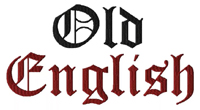Latin influence on English
Educated people of the time were competent in Latin, which was the scholarly and diplomatic lingua franca of Europe at the time. There were three main periods of Latin influence. The first occurred before the Saxons left continental Europe for Britain. The Germanic tribes traded and fought with the Latin speaking Roman Empire. Many words (some originally from Greek) therefore entered the vocabulary of these Germanic people via Latin: anchor, butter, camp, cheese, chest, cook, copper, devil, dish, fork, gem, inch, kitchen, mile, mill, mint (coin), noon, pillow, pound (unit of weight), punt (boat), sack, street, wall, wine. Besides, Britain was a Roman colony between AD 43 and about 410.
During the occupation of Britain the Romans founded a number of important settlements, many of which still survive: London, Bath, Canterbury, York, Chester, Manchester, Colchester and others. The second period of the influence of Latin began when the Anglo-Saxons were converted to Christianity. Christian missionaries coming to Britain in the 6th century and 7th century brought with them Latin religious terms which entered the English language: abbot, altar, apostle, candle, clerk, mass, minister, monk, nun, pope, priest, school, shrive. The third and largest arrival of Latin-based words happened after the Norman Conquest of 1066, when an enormous number of Norman words began to influence the language. Most of these words were derived from Old French and from classical Latin. The Norman Conquest marks the end of Old English and the beginning of Middle English.
 Old English. Norse influence. Celtic influence
Old English. Norse influence. Celtic influence Old English. History
Old English. History Old English
Old English